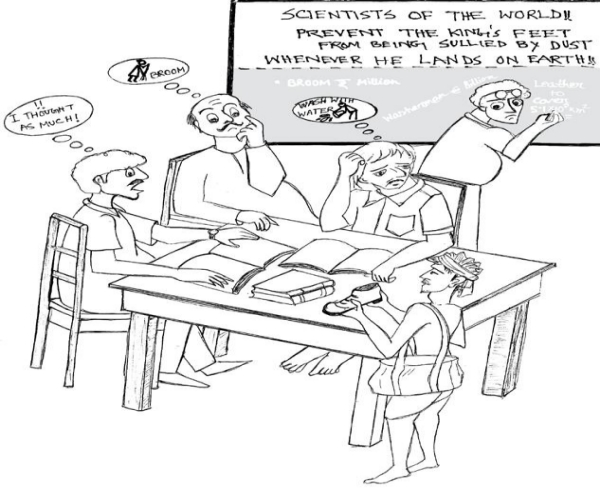On Frugal Innovation, again
Where to look for REAL innovation? In large companies, or “at the bottom of the pyramid”?
One week ago I summarized, from a speech of prof. S. Bhaduri, the main reasons why everybody should know and demand “frugal innovation”. Here are a few more relevant quotes, from the conclusions of the same speech.

Scientists of the world prevent the King's feet from being sullied by dust whenever he lands on Earth
</em></u>
Research at the Centre for Studies in Science Policy in India has often found a tendency among people involved in informal innovative activities to undermine the knowledge they themselves hold and the innovative efforts they undertake.
Are you an innovator? No. YES, you are
[As an example], a farmer involved in shifting cultivation in Nagaland categorically insisted that he had not introduced any changes to the cultivation method in his entire lifetime until the translator tweaked the question and asked how come he had not changed his cultivation technique when the whole world is changing so much. In reply, the farmer showcased four different types of hen-hoes used for cultivation, all bearing testimony to his awareness of changes in the local availability of raw materials and concern for efficiency.
Such informal innovators learn not only by ‘doing’, but also by merely being there and observing others doing, which is perhaps why it is often difficult to decode their source of knowledge and precise mechanism of learning.
It is important to point out that the more successful cases of interaction and collaboration [between institutions and the “bottom of the pyramid”] take place at the very site where knowledge is produced and grass-roots innovation takes place.
In contrast, the collaborative activities noted by [other researchers] take place… at the laboratories of scientific institutions and the majority of these collaborations have ended in failure.
One wonders whether or not the lack of trust and respect for local knowledge by scientific institutions is an outcome of the ‘contempt’ for practical knowledge.
One may then argue, with a reasonable degree of confidence, that contempt for practical knowledge leads to a difference between the scientists/engineers and the small and the marginal innovators in their worldview on what constitutes a good technology.
The appropriation of “useful knowledge” is always the concern of economists
From a utilitarian perspective, patents can bring benefits if innovations are commercialized on a large scale, which is not automatic, at least, for many grass-roots innovations, leaving such property devoid of much use. In addition, putting undue trust in the scaling up or large-scale commercialization by [public agencies] seems to have had a demotivating effect on some innovators by inculcating a belief that large-scale commercialization is more important than solving local problems.
The discourse on frugal innovation can provide an alternative approach to this debate. On the positive side, this discourse has explicitly acknowledged the knowledge and behavioural features of the small and the marginal, as well as their importance for innovation.
Being a latecomer in the field, the discourse on frugal innovation has the advantage of drawing strength from the conceptual contributions (*) of the appropriate technology movement and the technological capability school of thought in the field of innovation. The notions of “minor innovation” and “incremental innovations” are nowadays more accepted among scholars, practitioners and policy-makers in the field of development, primarily due to the ground laid by those two schools of thought. Frugal innovation can, therefore, legitimately claim a place in the discourse on innovation, easily. However, this discourse will have to go beyond large business organizations and explore the nuances and challenges of innovative behaviour among the individuals and communities at the bottom of the pyramid.
Once this is done, it will have the advantage of the new developments in the field of development theories, due to Amartya Sen, to reshape the discourse on innovation and development by analysing capability, agency and the freedom of individuals.
(This post was drafted in June 2020, but only put online in August, because… my coronavirus reports, of course)
(*) See my other excerpt of the same paper for short definitions of “appropriate technology movement” and “technological capability school”
Who writes this, why, and how to help
I am Marco Fioretti, tech writer and aspiring polymath doing human-digital research and popularization.
I do it because YOUR civil rights and the quality of YOUR life depend every year more on how software is used AROUND you.
To this end, I have already shared more than a million words on this blog, without any paywall or user tracking, and am sharing the next million through a newsletter, also without any paywall.
The more direct support I get, the more I can continue to inform for free parents, teachers, decision makers, and everybody else who should know more stuff like this. You can support me with paid subscriptions to my newsletter, donations via PayPal (mfioretti@nexaima.net) or LiberaPay, or in any of the other ways listed here.THANKS for your support!